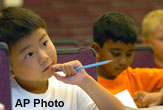U.S. Leadership in Science May Depend on 8th-Graders

It's not your skill at crunching numbers that determines whether you'll grow up to be a scientist, but how badly you want to be one as a child, new research shows.
The study analyzed surveys from a group of 8th-graders in 1988 that later received their college degrees, finding that early interest goes a long way in career choice.
The finding bears on current shortcomings seen in U.S. science education and professional research.
Emphasizing science
The National Research Council has reported that the United States is slipping in its leadership in science and technology fields.
And according to data from the National Science Foundation, the number of doctorates in the physical sciences and engineering earned by Americans has declined in the past decade. The agency also says the United States is losing its lead in robotics. Yesterday, the NSF announced it was opening an office in China , acknowledging "China's increasing importance as a world science and technology player."
If education is to help the United States stay competitive, it seems little progress is being made. The average science score for eighth graders on a standardized national test has remained unchanged from 1996 to 2005, officials with the Nation's Report Card project announced yesterday.
Sign up for the Live Science daily newsletter now
Get the world’s most fascinating discoveries delivered straight to your inbox.
But the results of the career-path study, detailed in the May 26 issue of the journal Science, indicate that the situation could potentially be remedied if the importance of science is emphasized early on.
"To the question, does it matter if a person decides early on whether to pursue science? The answer is yes," said Robert H. Tai, assistant professor of science education at the University of Virginia. "While the outcome may not be surprising, in light of the many stories we've all heard about the lives of famous scientists, this study put this notion to the test and found a link between early life expectations and future life outcomes."
Life is not a standardized test
Tai and his colleagues looked at 3,359 students who received their college degrees by the year 2000 and were previously asked as 8th-graders what kind of work they wanted to do by the time they are 30.
The grade-schoolers who responded that they wanted to go into the sciences turned out to be twice as likely to get a degree in the life sciences, such as biology, compared to those who were interested in other careers. They were three times as likely to build a career path in the physical sciences and engineering than those with non-scientific aspirations.
The study also found that kids with average math capabilities but with science-related expectations are much more likely to earn physical science or engineering degrees than high math achievers without this interest.
Schools get penalized if students don't pass and make yearly progress on standardized tests. Therefore, many teachers are gearing their classrooms to accommodate this criterion, critics say, rather than focusing on skills that prepare students for various careers and encourage them to consider a range of job possibilities.
"Life is not a standardized test," Tai said. "We should use testing to help us learn more about how best to teach children. But kids are not being encouraged to go into science by testing."










